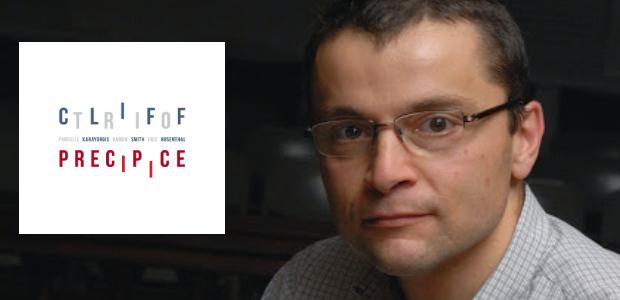Pandelis Karayorgis: The written material serves as diving board

Pandelis Karayorgis is an American pianist, composer, cofounder of Driff Records label and above all – a great improviser. I talked to him about his last recordings, music of Steve Lacey, activity of his label and his vivid experiences with improvisation.
You’ve established your own label with Jorrit Dijkstra. Why have you decided to take this step?
In 2012 we started Driff Records as a way to release our own projects while keeping control of all aspects of planning, production, scheduling, promotion and revenue. Both of us have previously worked with other labels, and we still do, but doing it ourselves has been gratifying and liberating—even if it requires a lot of work and resources. I feel that we have a created a consistent catalog (18 physical and two digital releases) that has a very defined musical focus and production values. The label has also maintained a unified look in our design and presentation.

Why have you decided to release your second album “Precipice” with Cliff Trio in Fundacja Słuchaj?
Different labels can reach different audiences. I am hoping that releasing our work on Fundacja Słuchaj will allow us to reach more people in Poland, where there is a sophisticated audience for this kind of music, than we normally do with Driff Records. Hopefully when the pandemic is over, we might be able to present our music live there too.
On the “Precipice” there are 5 compositions, but there is very fine line between improvisation and composed stuff. Could you please tell us about the process when composed things transform into improvisation?
On Precipice, and with Cliff Trio in general, we only play improvised music, whereas with Pools and CliffPools we’ve been using a combination of compositions, arrangements, or sketches for the piano part.
Regarding the question of how composed things transform into improvisation, we should also think of the reverse—how does the vocabulary of improvisation transform itself and condense itself into composition? That reciprocal relationship is self-evident when you look at the seamless integration between compositions and improvisations of people like Thelonious Monk, Ornette Coleman, Steve Lacy, Charlie Parker, Lennie Tristano and others. All of them had created a unique voice as improvisers, and their compositions where like stills of their language, like codes or definitions for the solos to follow. So, the jump from composition to improvisation will be ideally be just an extension of the ideas set on paper, the written material serving as a diving board. But even in the absence of composed material or even arrangements, the DNA of the music exists in the shared musical language and vocabulary of the musicians, making it possible to “create something out of nothing.” A lot of work and commitment goes into developing that language and its rules. Only when all of those things are in place do things start happening seemingly “on their own.”
You’ve recorded the album CliffPools with your “double band” (it is a mix of two of Pandelis’s trios: Cliff and Pool). What have you gained thanks to this double trio? What kind of effect you wanted to achieve? Did it go well? Was the improvisation and playing with two drum sets and two basses much different from a standard trio?
The double trio was a tremendous experience. It bridged the work we had done with each group separately in the most natural and organic way. Knowing these musicians, I shouldn’t have been surprised, but from the first minute we played together the rapport was unbelievable. On the one hand it felt like one trio on steroids, on the other, it felt like more than one group, as if there were added dimensions. I would love to do more work with this formation if travel and logistics weren’t so complicated.
Could you please tell us about Steve Lacy? What kind of inspiration is he for you? Tell us about the idea of the project The Whammies.
Thelonious Monk’s music was my formative influence and biggest inspiration. Steve Lacy, to whom of course Monk was a mentor, came into focus for me later, and especially while working with The Whammies. That group began as a brainchild of Jorrit Dijkstra, who studied with Lacy and already knew Han Bennink. Jorrit also had access to Lacy’s notebooks that included many unrecorded compositions, some of which we used. I was always a big Lacy fan, but this gave me an opportunity to dig deeper into his music in the company of an exceptional group.
“The Whammies didn’t have to bring the music of Lacy up to date or interpret it in a specific way. Against the free jazz trends, the sextet abide by the provisions of melody and rhythm of Lacy’s music. Thanks to this, they came up with a very advanced avant-garde music without going overly intellectual”. Do you agree with this sentence? How would you describe the music of The Whammies?
That sounds right, The Whammies approached Lacy’s music with respect for the score but at the same time with a great appetite for exploring the possibilities the music pointed to. Having Han Bennink at the heart of this group (most of the time), defined some of the approach. Han, Jorrit and Mary Oliver, all rooted in the Dutch improvising scene, brought an emphasis to fast-paced musical segments, instant arranging, and sometimes an irreverent spirit. Having Nate McBride or Jason Roebke on bass and Jeb Bishop on trombone balanced things out in other ways. Ultimately I think we had a unique sound, and much of the group’s dynamic has been transferred to Cutout, our collaborative quintet with Jorrit, Jeb, Nate, Luther Gray and myself. The main difference is that with Cutout, we play our own compositions.
On the second album with Lacy’s music you’ve recorded a solo version of “Wickets” on a grand piano. In my opinion it is one of the best versions of this song. Do you consider recording solo album? What would be the most demanding thing for you during such process?
I recorded a solo album in 2004, “Seventeen Pieces”: https://karayorgis.com/Pages/CDPages/SeventeenPieces.html
I have been thinking of doing another one, it would be a very different concept all these years later.
You have a typical Greek name. Could you tell us something about your roots?
I grew up in Athens and started playing jazz there in the early 80s while I was a student at the University. The late 70s-early 80s were a time when a lot of important improvising musicians from the U.S. and Europe came through Greece, it was a brief period when both jazz and free improvised music had their moment there—there were magazines, festivals, venues. It was an inspiring and formative time for me, not only strictly musically, but also in the sense that it showed me music as connected to political will and action. I came to Boston in 1985 to study jazz piano at the New England Conservatory and mostly stayed there after that.
Some CD covers in Driff Records are made by you. Are you interested in photography and graphic?
Yes, photography is big interest for me and I also dabble in design a bit. I have done some photography for the covers, but Driff Records sleeves are all designed by Hidde Dijkstra, Jorrit’s brother, who is a very talented professional graphic designer.
In those strange times, it is impossible not to ask about coronavirus. How do you deal with this situation as a musician and as a U.S. citizen? (How does it affect your work, plans and everyday live? What do you think: will the music world change after this pandemic in any way?)
Yes, these are difficult times, especially here in the U.S. with a president who puts his ratings and re-election above everything else. Musicians are hard hit, and there’s no way around it, virtual concerts and discography can do little to fill the void. Hopefully we will get over it before too long. In the post-pandemic era, one of the many things we will gain more appreciation for, is the ability to share music making together, as musicians and audiences. We had taken it for granted and now realize how much we miss it.
- Aby wysyłać odpowiedzi, należy się zalogować.







